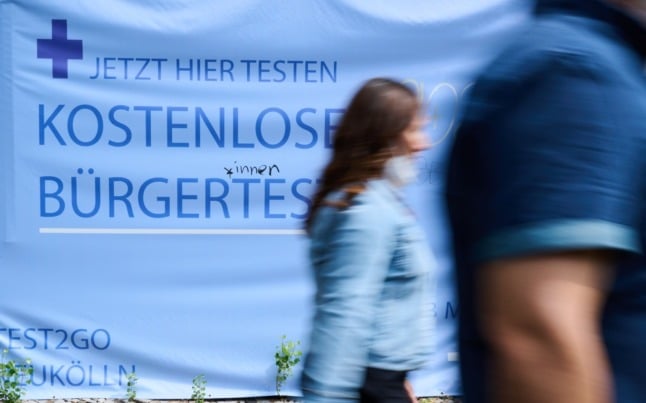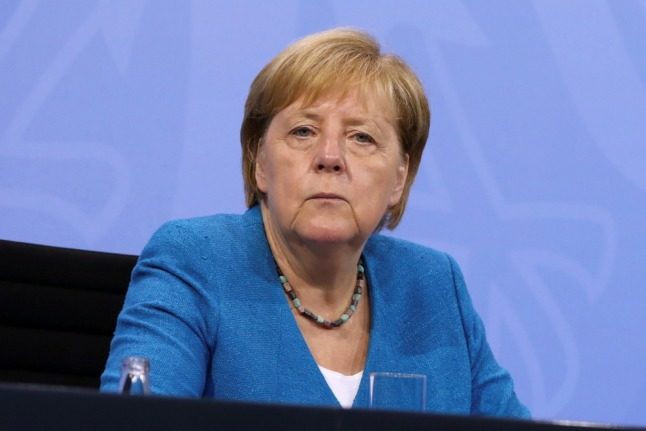Covid-19 tests or proof of vaccination or recovery will be required to access facilities including restaurants, cinemas and gyms, in areas where infection rates rise above a certain threshold.
From October those who refuse to get jabbed will have to pay to prove they are infection-free, or risk being shut out.
Proof of test or vaccination will be required as soon as the rate of infections in a region reaches 35 per 100,000 people over seven days.
READ ALSO: Germany plans ‘full freedom’ for vaccinated in Covid crunch talks
With the new plans for paid-for tests in place, politicians hope that people who are currently on the fence will decide in favour of vaccination.
However, there will be exemptions in place for people who cannot get vaccinated for medical reasons, such as pregnant women, children and people with compromised immune systems.
Tests will continue to be free-of-charge for this group of people, the government confirmed.
Germany ‘no longer leading the way’ in vaccination
Germany’s incidence rate stood on Tuesday at 23.5, but several regions including Berlin and Hamburg are already past the 35 mark.
After delivering well over one million jabs a day at its peak, Europe’s most populous country has seen the takeup for inoculation against the coronavirus slow dramatically.
As of Tuesday, 52 million people in Germany – or 62.5 percent of the population — have received at least one dose of the vaccine, but Merkel said she hoped another 15 to 20 percent would get the jab.
“It is everyone’s responsibility … to promote vaccination wherever possible,” said German Chancellor Angela Merkel, urging “all friends and family members who have been vaccinated to promote this in their circles of friends and families and sport clubs”.
Merkel voiced her frustration at the lethargic pace of the nation’s vaccination campaign.
The good news, she said, was that vaccination was having an effect on severe course of Covid – especially among the elderly.
“The not-so-good news is that the pace of the vaccine campaign has declined considerably,” she said.
“Germany is not leading Europe in vaccination coverage anymore. There’s a row of countries that are doing better and where people are happier to get vaccinated than in Germany.”
READ ALSO: German states return more than 2.7 million unused vaccine shots
At the roundtable between the federal and state governments, politicians had all agreed that they wanted to see “low-threshold measures” to protect the population, she added.
These include social distancing and mask-wearing rules.
“We hope that the vaccination rates will increase dramatically after the summer holidays, and then the oversight will be a lot easier than with a vaccination quota of 55 percent,” Merkel explained.

‘Indirect compulsory vaccination’
Merkel has repeatedly said she does not think it is right to make vaccinations compulsory.
But critics accused her government of using tests as a tool to pressure the population to get jabbed.
Alice Weidel, leader of the far-right AfD who is herself not vaccinated, said the move was an “indirect compulsory vaccination through restrictions, bans and additional burdens”.
Merkel countered that vaccinated people cannot simply be asked to continue to be subject to restrictions because part of the population opted against jabs.
“We also have to think about those who work in hospitals, and overloading the health system must be ruled out,” she added.
Germany’s latest move is similar to new requirements in France of a health pass to access cinemas, cafes or trains.
The push by French President Emmanuel Macron for the health pass which is proof of either vaccination, a recent negative test or recovery from Covid-19, has sparked angry protests across France.
In Germany, regular protests have also broken out against coronavirus restrictions as well as vaccinations.
Restrictive measures ‘could be necessary in autumn’
Though a future lockdown has previously been deemed ‘unlikely’ by the Federal Health Ministry, Merkel hinted at the conference that tougher measures could come into force if the situation continued to worsen in the coming months.
READ ALSO: Germany considers tougher rules for the unvaccinated in autumn – but ‘drastic lockdown unlikely’
However, rather than relying solely on the 7-day incidence of Covid infections per 100,000 – which has previously guided Covid legislation – politicians would look at infection rates, vaccination coverage and severe courses of Covid (i.e. hospitalisations) all together, Merkel said.
At Tuesday’s meeting, ministers also agreed to extend workplace Covid regulations, which include regular testing and social distancing measures.
There had also been discussions of introducing a home-office requirement when the 7-day incidence of infections per 100,000 people rose above 50 – but nothing has been confirmed on that as yet.



 Please whitelist us to continue reading.
Please whitelist us to continue reading.
Member comments